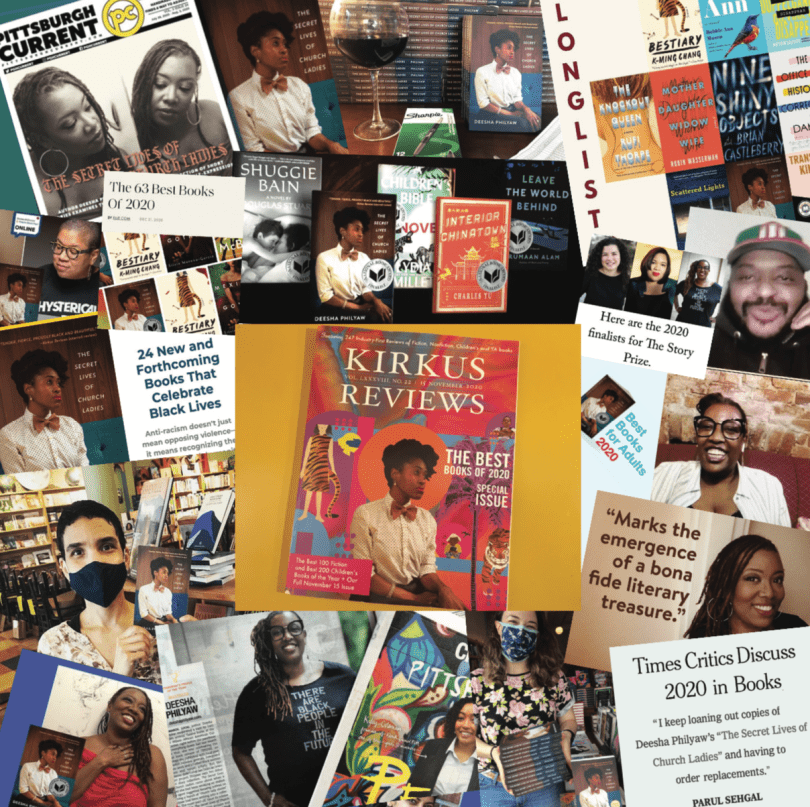
Deesha Philyaw’s The Secret Lives of Church Ladies, published in September 2020 by West Virginia University Press, was awarded The Story Prize and the PEN/Faulkner Award for Fiction. Philyaw’s book is also a finalist for the LA Times Book Prize for First Fiction. We’re pleased to share below an abridged transcript from an event hosted by Penguin Bookshop, featuring Philyaw in conversation with her friend Yona Harvey, author of the recently published You Don’t Have to Go to Mars for Love (Four Way Books).
Upcoming Online Events with Deesha Philyaw:
L.A. Times Festival of Books – April 23 – Register here.
National Antiracist Book Festival (with Kiley Reid) – April 24 at 12:00pm – Register here.
Penguin Bookshop presents: Yona Harvey and Deesha Philyaw from Vesto on Vimeo.
YONA HARVEY: It seems like you’re having a lot of fun writing this story collection. I read it as a poet, all the ways that you experiment with form in your collection. Do you want to talk about that a little bit?
DEESHA PHILYAW: I think it’s my way of holding my own interest. That’s how I play –instead of a straight narrative, what if it was a series of letters? Or something that was kind of drawn from my own life that was a phone call? There are some elements of revenge in these stories from situations that were real and this is what I wish I had done. It keeps it interesting for me and it helps me not think about how are people going to react. I can escape through form and I can kind of hide in there a little bit and do what I want to do. It helps to drown out those kinds of doubts and questions that just get in the way.
For example, Instructions for Married Christian Husbands is the last story I wrote in the collection. At that point, my eyes were crossing and the deadline was there. I had about 10 pages of it written as a traditional story and I was just not feeling it at all. But then I thought, “Well, what if the woman, in this case, the person who’s disparaged the most – the side chick – what if she controlled the narrative and what if she was literally calling the shots?” I took the first opening scene of what I had drafted to be the story that I was no longer interested in, and did that what if. What other instructions would she give instead of it being this one guy?
YONA HARVEY: You talked a little bit just a minute ago about doubt or not having these intruding voices. Do you feel like that was something that you struggled with earlier in your career or is it an ongoing career?
DEESHA PHILYAW: It was definitely an issue earlier for me, early on when I started writing fiction because my fiction was pretty autobiographical early on. There was always this thread of discontented women. Dissatisfied women. I was writing to disguise my own dissatisfaction. I wanted to explore some of these things that I was dealing with and so fiction was kind of a cover. Thankfully, I just don’t think about it as much now. I can’t worry about how anybody’s going to feel. I just felt like I don’t have that kind of time to worry about that. We have these opportunities to share these narratives. I don’t want to put something out there unless it’s what I want to say. I can’t hold back for somebody else’s comfort.
YONA HARVEY: When I read this collection, it reminded me so much of missing Toni Cade Bambara and Jay California Cooper, Gloria Naylor. Their aesthetic and their focus on black women’s lives. I don’t know if you thought about any of those writers when you were writing this book. It was just very special to be reconnected with that type of literature.
DEESHA PHILYAW: I am grateful to you for first speaking their names in the same vicinity of these same stories because I hadn’t really been thinking about them and I think you hesitate to ever make those kinds of comparisons. You were the first person to put my work in that context. It gave me the confidence to then reference them. I certainly read their work and Alice Walker and Toni Morrison. Those two specifically though, because there’s that – I call it a southern-ness. It could be something else but for me it speaks to my mother and my grandmother and all of the women that I come from. Jay California Cooper’s work, Toni Bambara’s work and Z.Z. Packer’s just amazing short story collection Drinking Coffee Elsewhere. Their words and their stories and their characters absolutely just took my breath away and still do. I am so grateful for their work.
Deesha Philyaw’s debut short story collection, THE SECRET LIVES OF CHURCH LADIES, won the 2020/2021 Story Prize, and was a finalist for the 2020 National Book Award for Fiction, the 2021 PEN/Faulkner Award for Fiction, and a 2020 LA Times Book Prize: The Art Seidenbaum Award for First Fiction. THE SECRET LIVES OF CHURCH LADIES focuses on Black women, sex, and the Black church, and is being adapted for television by HBO Max with Tessa Thompson executive producing. Deesha is also a Kimbilio Fiction Fellow. For more information, visit her website.
Yona Harvey is the author of the poetry collections You Don’t Have To Go To Mars for Love (Four Way Books, 2020) and Hemming the Water (Four Way Books, 2013), winner of the Kate Tufts Discovery Award. She contributed to Marvel’s World of Wakanda and co-authored with Ta-Nehisi Coates Black Panther and the Crew. She has worked with teenagers writing about mental health issues in collaboration with Creative Nonfiction magazine and received the inaugural Lucille Clifton Legacy Award in poetry from St. Mary’s College of Maryland. For more information, visit her website.
